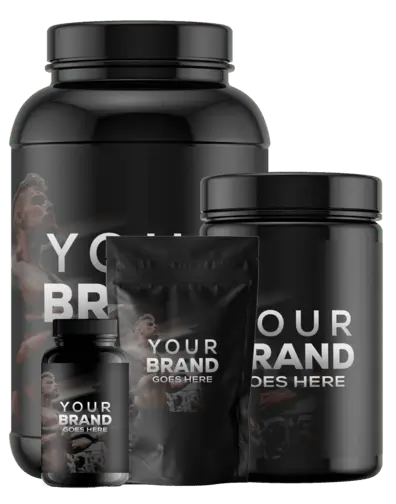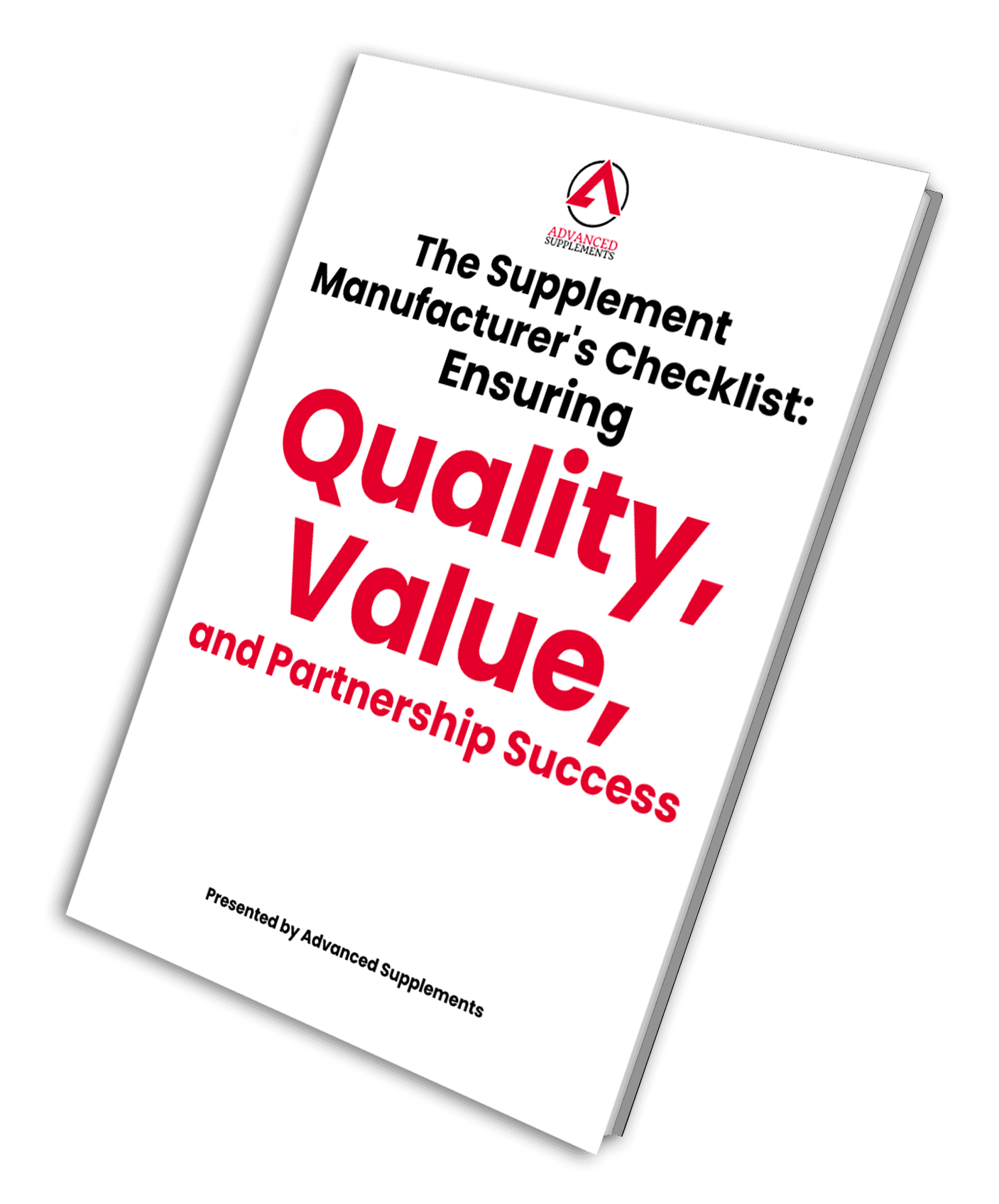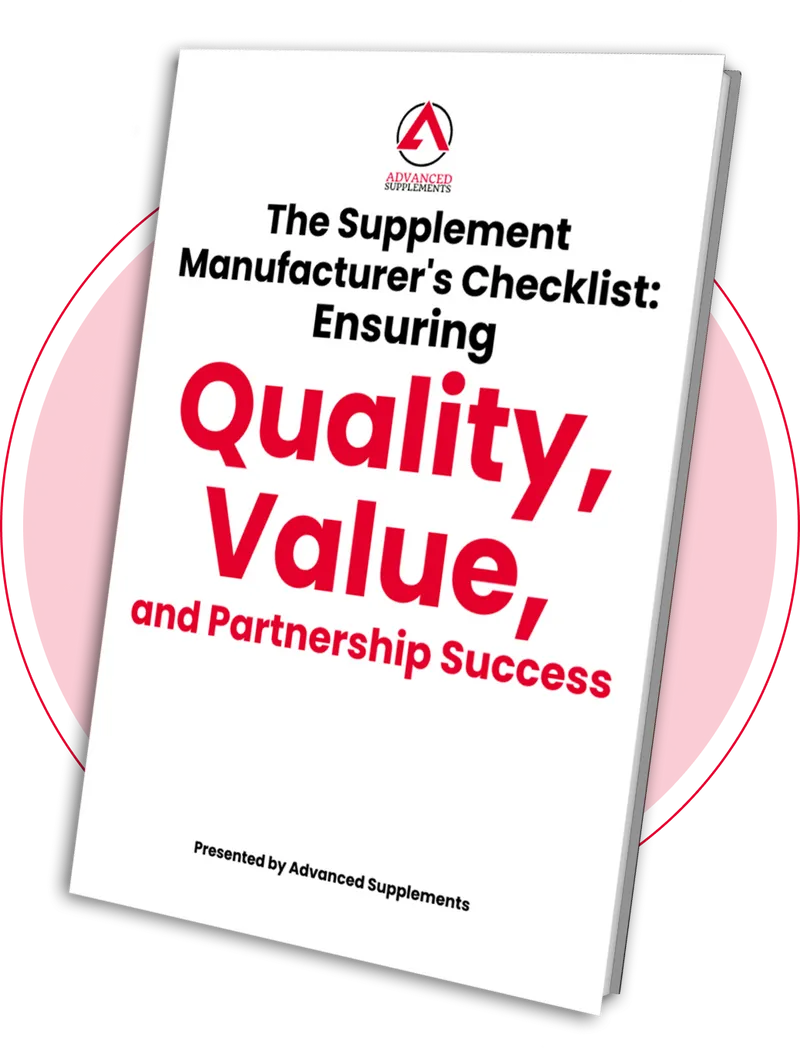Finding the right manufacturing partner is one of the most critical decisions for your supplement brand. The wrong choice leads to quality problems, compliance issues, production delays, and wasted investment. These mistakes can destroy brand reputation before products even reach consumers.
Over 70% of new supplement brands fail within the first year. Many failures trace back to poor manufacturer selection and inadequate research during the vetting process. This guide provides 10 expert tips to help you find a reliable supplement manufacturer who protects your brand and supports sustainable growth in competitive markets.
How to Select a Trusted Supplement Manufacturer and Company?
Choosing the right supplement manufacturer and company ensures product quality, safety, and compliance. These tips guide you to make smart, confident decisions for your brand’s success.
1. Define Your Product Requirements Clearly
Before contacting manufacturers, you need complete clarity on product specifications. Write down your product type, delivery format, target ingredients, serving sizes, and expected order volumes. This preparation prevents wasted time with facilities that cannot meet your specific needs.
Consider whether you need capsule manufacturing, tablets, powders, gummies, or liquid formats. Each delivery method requires different equipment, expertise, and production capabilities. Some facilities specialize in one format while others offer comprehensive options. Understanding gummies vs capsules helps you select the right delivery method for your target audience and market positioning.
Think about your ingredient list carefully because certain compounds require special handling. Probiotics need climate-controlled storage while enzymes demand specific temperature ranges during production. Manufacturers experienced with these specialty ingredients prevent costly formulation problems and stability issues down the road.
2. Verify FDA Registration and Compliance Status
Every legitimate supplement facility must register with the FDA as a food facility. Domestic facilities register directly while foreign manufacturers designate a U.S. agent for FDA communications. According to Registrar Corp’s FDA regulations guide, facilities must renew their registrations between October 1 and December 31 of each even-numbered year.
Request the manufacturer’s FDA registration number and verify it through official FDA databases. Check their inspection history for warning letters, violations, or compliance issues that could put your brand at risk. Facilities with clean inspection records demonstrate commitment to quality standards and regulatory adherence.
Ask about their current Good Manufacturing Practices compliance too. The FDA requires all supplement manufacturers to follow strict quality protocols covering everything from ingredient testing to production processes and documentation requirements. Understanding key regulations in supplement manufacturing helps you evaluate whether facilities meet professional standards.
3. Look for Third-Party Certifications
Beyond basic FDA registration, third-party certifications demonstrate higher quality standards. Look for NSF GMP certification as a primary requirement because this independent verification proves the facility follows strict quality protocols and undergoes regular audits.
According to NSF International’s certification process, auditors spend 2 to 5 days at manufacturing facilities evaluating quality systems, production processes, and documentation practices. This thorough review ensures facilities maintain consistent standards across all operations.
Additional certifications like Kosher, Halal, Organic, or FSSC 22000 show the manufacturer can meet specialized market requirements. These credentials open doors to specific consumer segments and retail channels that require verified compliance standards.
Some manufacturers also hold certifications for specific ingredients or production methods. Vegan certification matters if you plan targeting plant-based consumers with products using vegan vs gelatin capsules.
4. Evaluate Production Capacity and Scalability
Your manufacturer should handle both current needs and future growth projections. Ask about minimum order quantities, maximum batch sizes, and production schedules. Some facilities cater to emerging brands with lower minimums while others require large commitments suitable only for established companies.
Production capacity affects lead times and flexibility significantly. Manufacturers running at full capacity struggle to accommodate rush orders or schedule changes. Facilities with available capacity provide better service and faster turnaround times for your projects.
Consider scalability when evaluating options because switching manufacturers later creates major headaches. Moving formulations, requalifying products, and establishing new relationships costs time and money while disrupting supply chains.
5. Assess Technical Expertise and Formulation Support
The best manufacturers offer more than just production capabilities. They employ food scientists, nutritionists, and regulatory experts who provide formulation guidance and technical support throughout development.
Ask what formulation services they provide. Can they help optimize ingredient ratios for bioavailability? Do they conduct stability testing to determine shelf life? Will they suggest improvements to enhance product effectiveness or reduce costs?
Experienced teams understand ingredient interactions, dosing strategies, and delivery system optimization. This expertise proves invaluable during formulation development and prevents expensive mistakes that compromise product quality or market performance. Learning about how pre-workout supplements are made demonstrates the complexity involved in proper formulation development.
6. Review Quality Control and Testing Protocols
Comprehensive testing throughout production ensures every batch meets specifications and safety standards. Your manufacturer should conduct multiple tests at different production stages from raw materials through finished goods.
Ask about their testing capabilities and protocols. Do they have in-house laboratories or use third-party facilities? What analytical methods do they employ for potency verification and contamination screening?
Quality manufacturers test raw materials for identity, purity, and contaminants before production begins. During manufacturing, they monitor processes continuously. Finished products undergo final testing for potency, microbiological safety, and heavy metals. Understanding quality control in supplement manufacturing helps you evaluate whether a facility meets professional standards for consumer safety.
7. Investigate Their Ingredient Sourcing Network
Quality starts with ingredients, so manufacturers need strong supplier relationships. Ask about their ingredient sourcing practices and supplier qualification processes. Do they work with reputable suppliers who provide complete documentation for every ingredient batch?
Manufacturers should verify supplier certifications and audit facilities regularly. They need systems to track ingredients from source through production for complete traceability. This becomes crucial if recalls or quality issues arise requiring investigation.
Request information about how they handle specialty ingredients requiring specific storage or testing. Premium manufacturers maintain climate-controlled storage and proper handling procedures that preserve ingredient potency and effectiveness throughout production.
8. Understand Pricing Structure and Hidden Costs
Manufacturing costs involve more than just per-unit pricing. Request detailed quotes breaking down all expenses including setup fees, material costs, testing charges, packaging, labeling, and shipping.
Some manufacturers quote attractive per-unit prices but add hidden fees that dramatically increase total project costs. Others include comprehensive services in transparent pricing structures. Understanding variables that impact manufacturing costs helps you compare quotes accurately across multiple facilities.
Volume discounts typically apply as order sizes increase, so ask about pricing tiers. Factor in minimum order requirements when calculating your actual per-unit costs because small initial orders often carry premium pricing.
Consider total value rather than just the lowest price. Cheaper manufacturers may cut corners on testing, use inferior ingredients, or provide poor customer service that costs you more in the long run through quality problems and production delays.
9. Check References and Client Testimonials
Speaking with current clients provides valuable insights into day-to-day working relationships. Request contact information for brands the manufacturer currently serves, preferably those in similar categories or at comparable business stages.
Ask these references about communication quality, problem-solving abilities, and how the manufacturer handles challenges or delays. Do they meet promised timelines consistently? How do they respond when issues arise during production?
Online reviews and testimonials offer additional perspective, but direct conversations with references reveal more authentic feedback about manufacturer performance and reliability over time. Pay attention to recurring themes in feedback whether positive or negative.
10. Evaluate Customer Service and Communication Standards
Ongoing communication separates great manufacturing partners from mediocre ones. During initial conversations, notice how quickly they respond to inquiries and whether they provide clear, detailed answers to your questions.
Will they assign a dedicated account manager to your projects? How do they handle urgent requests or changes to production schedules? What systems do they use for order tracking and status updates?
Manufacturers who communicate proactively about production status, potential delays, or quality concerns prevent surprises that disrupt business operations. This transparency builds trust and enables better planning for inventory management and product launches.
Making Your Final Supplement Manufacturing Decision
Selecting a supplement manufacturer requires careful evaluation across multiple factors. Start by narrowing options to facilities meeting your basic requirements for format capabilities, certifications, and capacity.
Visit finalist facilities when possible or schedule virtual tours to see operations firsthand. Review equipment, observe quality systems, and meet the team members who will support your projects.
Compare detailed quotes carefully because the lowest price rarely delivers the best value. Factor in all costs, services included, quality standards, and long-term partnership potential when making your final selection.
Remember that relationships with manufacturers develop over time through successful projects and open communication. Start with smaller initial orders to evaluate their performance before committing to large volumes or long-term contracts.
The right manufacturing partner does more than just produce supplements. They become an extension of your team, providing expertise, ensuring compliance, and supporting your brand growth through quality products that consumers trust and repurchase consistently.
Frequently Asked Questions
-
What certifications should a supplement manufacturer have before I work with them?
Look for NSF GMP certification and FDA registration as essentials. Additional certifications like Kosher, Halal, Organic, or FSSC 22000 show credibility and compliance with global quality standards.
-
How do I verify a manufacturer’s FDA registration and compliance history?
Ask for their FDA registration number and verify it through the official FDA database. Review inspection records for warning letters, violations, or compliance issues before partnering.
-
What questions should I ask during manufacturer facility tours?
Ask about equipment, quality control, and staff training. Observe cleanliness, organization, testing labs, and ingredient storage to ensure high manufacturing standards and reliability.
-
How long does it typically take to find and vet a supplement manufacturer?
The vetting process usually takes 4 to 8 weeks, including research, certification checks, references, and facility visits. Rushing can lead to quality or compliance risks later.
-
What are red flags that indicate I should avoid a supplement manufacturer?
Avoid companies lacking certifications, references, or FDA transparency. Unrealistic pricing, poor communication, or refusal of tours signal potential quality and reliability issues.




